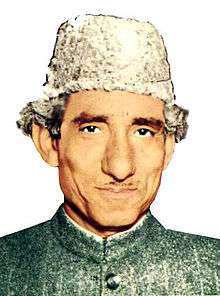Ghulam Mustafa Tabassum
| Sufi Tabassum صوفی تبسم | |
|---|---|
 | |
| Born |
Ghulam Mustafa Tabassum 1 October 1898 Amritsar, British Punjab |
| Died |
7 Feb 1978 (aged 80)[1] Lahore, Pakistan |
| Occupation | Poet |
| Nationality | Pakistani |
| Genre | Fiction |
| Subject | Literature |
Ghulam Mustafa Tabassum (4 August 1899 – 7 Feb 1978)[1] was a 20th-century poet. Tabassum (or Tabussum) was the pen name by which he was universally known.[2]
He is best known for his many poems written for children, as the creator of the Tot Batot character, and as the translator of many poetical works from Urdu and Persian into Punjabi. Tabassum's style is in the classical tradition, with a deep awareness of the pain and suffering that afflicts people in modern life.[3]
Tabassum was born in Amritsar, Punjab, to parents of Kashmiri ancestry. He earned a master's degree in Persian from Forman Christian College (FCC) in Lahore. He remained with Government College Lahore for his entire career, rising to head the 'Department of Persian Studies'.[2]
His poetry featured on radio and television
For fifty years, he was actively participating on Radio Pakistan and Pakistan Television poetry-reciting events.[3] His poems were used as the lyrics of several songs sung by Noor Jehan, Naseem Begum, Farida Khanum and Ghulam Ali.[4]
| Song | Singers | Song lyrics by | Music by | Produced by |
|---|---|---|---|---|
| "Sau Baar Chaman Mehka, Sau Baar Bahar Aaee" | Naseem Begum[5] | Ghulam Mustafa Tabassum | Rasheed Attre | film Shaam Dhalay (1960) |
| "Aye Puttar Hattan Tay Nahin Vikday, Tuun Labhdi Phirrein Bazaar Kurray" | Noor Jehan[6] | Ghulam Mustafa Tabassum | Hassan Latif Lilak | A Radio Pakistan, Lahore production (A Qaumi Naghma from 1965 war) |
| "Who Mujh Say Huay Ham Kalam Allah Allah" | Farida Khanum | Ghulam Mustafa Tabassum | Hassan Latif Lilak | A Pakistan Television, Lahore production |
| "Meray Shauq Da Nahin Aetbar Teinun" | Ghulam Ali[7] | Ghulam Mustafa Tabassum | A Pakistan Television production ('Nikhar' PTV program-1973) | |
| "Meray Dhol Sipaya Teinun Rab Dian Rakhhaan" | Shehzad Roy[8] and Ayesha Omer | Ghulam Mustafa Tabassum | Another 1965 War Qaumi Naghma redone by Shehzad Roy |
Awards and recognition
- In 1962, he received the Pride of Performance Award from the President of Pakistan
- In 1966, he received the Tamgha-e-Nishan-e-Sipaas award of the Government of Iran.[2]
- He was also awarded the Sitara-i-Imtiaz, Award (Star of Excellence) by the President of Pakistan.[9]
Works (partial list)
- Tot Batot Collection. Published by Ferozsons (no date), ISBN 969-0-01118-9.
- Ab Sab Hain Tot Batot Mian. Published by Gulzar Ahmed, 2000.
- Jholanay. Published by Ferozsons (no date)
- Dogona. Published by Ferozonsons (a translation of the works of Hazarat Ameer Khosro)
- Sawan Raina Da Sufna, a translation into Punjabi of Shakespeare's A Midsummer Night's Dream, unknown publisher
References
- 1 2 https://www.dawn.com/news/1238041, Profile of Ghulam Mustafa Tabassum on Dawn, Karachi newspaper, Published 8 Feb 2016, Retrieved 4 May 2016
- 1 2 3 "Poets". Encyclopedia of Pakistan. Overseas Pakistanis Foundation. December 2006. Archived from the original on 22 September 2008. Retrieved 4 May 2016., Ghulam Mustafa Tabassum's Biography
- 1 2 Leading Personalities of Pakistan, South Asian Media Net, Retrieved 4 May 2016
- ↑ Hamid, A (26 Nov 2006). "Nur Jehan: One in a Million". Daily Times (in Urdu and English). APNA (Academy of the Punjab in North America). Retrieved 24 Dec 2008., Retrieved 1 September 2015
- ↑ Ghulam Mustafa Tabassum film song on IMDb website, Retrieved 4 May 2016
- ↑ http://apnaorg.com/columns/ahameed/column-35.html, Noor Jehan sings Ghulam Mustafa Tabassum song, Daily Times newspaper, Lahore, Published 26 Nov 2006, on Academy of the Punjab in North America website, Retrieved 4 May 2016
- ↑ https://www.youtube.com/watch?v=btIS2NcWOjg, Ghulam Mustafa Tabassum song on YouTube, Retrieved 4 May 2016
- ↑ https://www.youtube.com/watch?v=_gzCDZPOrJ8, Ghulam Mustafa Tabassum song on YouTube, Retrieved 4 May 2016
- ↑ https://rekhta.org/poets/sufi-tabassum/profile, Ghulam Mustafa Tabassum's Sitara-i-Imtiaz Award info on rekhta.org website, Retrieved 4 May 2016